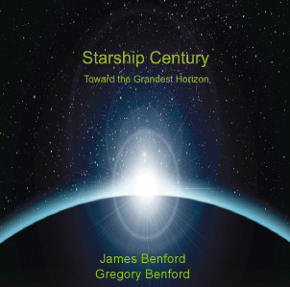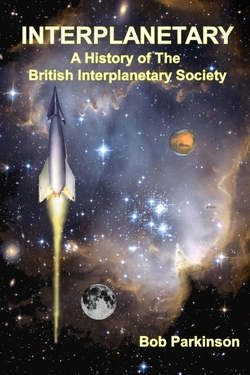The Arthur C. Clarke Center for Human Imagination is launching in May with what it describes as a ‘series of perspectives’ on what we can expect in the coming century. Its inaugural symposium begins on May 14 at the University of California at San Diego with discussions on design, artificial intelligence, synthetic life and science studies and thoughts from writers Jonathan Lethem and Kim Stanley Robinson on the literary imagination. But those with interstellar interests will want to put days 2 and 3 (May 21, 22) on their calendar, when the Starship Century Symposium convenes on the same site.
Gregory and James Benford have coordinated the latter event with the Clarke Center and will use it to present ideas on our possibilities among the stars as presented in their upcoming book Starship Century. Speakers will include prominent science fiction writers as well as many of the scientists most actively engaged in thinking about starflight. Thus we have Pete Worden (NASA Ames) as well as Neal Stephenson (The Diamond Age, Cryptonomicon, etc.) on the first morning, along with Robert Zubrin, of Mars Society fame, discussing what he calls the ‘economics of interstellar breakout.’ Futurist and business strategist Peter Schwartz will present “Starships and the Fates of Humankind.”
A section on the near-future including Geoffrey Landis on nuclear rocket options in the Solar System gives way the next morning to Adam Crowl’s talk on the development of starship concepts over the past century, Paul Davies on alien biospheres, Ian Crawford on interstellar destinations and John Cramer on exotic physics and the interstellar distance conundrum. Freeman Dyson offers a remarkable look (I’ve already seen this one) at what we might find as we move into the Kuiper Belt and the Oort Cloud beyond, especially in terms of how life might appear there or be created by human scientists working wonders with genetic engineering.
I’m told that available space is filling up fast. You can find the complete list of speakers and panelists, including Larry Niven, Jon Lomberg, Joe Haldeman, David Brin, Jill Tarter, Vernor Vinge and more, on the agenda page. Lodging is at the La Jolla Shores Hotel, with full details on the site. The Clarke Center frames the overall three-day event this way: Day 1 covers one-third of a century, the time between the creation of 2001: A Space Odyssey and the year it portrayed. Days 2 and 3 address what the Center calls “…a century long project: to create a starship.”
Addendum: Jim Benford has written to say that some of the material on the Starship Century site, from which I drew this article, is out of date. I’ll update with any schedule changes next week.




What an outstanding collection of authors and thinkers! Many of my favorites are planned to be there. Wish I could go.
Thank you Paul! More information and a soon-to-be-launched blog are available on our website as well. http://www.starshipcentury.com/
http://www.guardian.co.uk/society/2013/apr/06/sam-parnia-resurrection-lazarus-effect
Should invite this guy to talk about freezing people for a couple centuries.
So many interesting things going on and I spend most of my time at work. I am living life all wrong. There has got to be a way to fix this.
“There has got to be a way to fix this”
I say the same thing but I am unemployed; wanna trade?
GaryChurch, you always dredge up the interesting news! Fascinating article.
I really enjoyed Gregory Benford’s Timescape novel. There was a line that went something like ” I am not X, I am his avatar”. Say what? That makes sense today, but 30 years ago? I had to check the dictionary. A couple of years ago, Professor Benford spoke at a local IEEE Computer Society dinner about the rising levels of CO2 and possible mitigation approaches, which was very thought provoking. The combination of science and science fiction sounds great.
I hope to have the time to write a report on the conference for I4IS.org.
By the way, I’ll be driving into UCSD from Orange County each day. If anyone would like to carpool, please let me know (rmchung at gmail.com).
Gary Church, I don’t follow your comment. Parnia only has experience of resuscitating people after a few hours of death. He can only deal with cases of death from reversible causes, and the reason why we cannot live for more than about a century is from causes which are currently irreversible. But yes, in itself, a fascinating article.
Stephen
http://www.sciencedaily.com/releases/2006/06/060620171022.htm
http://engineering.dartmouth.edu/~d76205x/research/shielding/docs/Parker_06.pdf
http://authors.library.caltech.edu/3303/1/PARaipcp04a.pdf
2006 was a GREAT year for interesting news; If I was going to invite people to a space conference it would be these three people- I do not know how Dr. Parker’s health is so he might no show.
I have tried without success to contact Dr. Bogdan over the years- he might not speak any english. Kevin Parkin is about launch vehicles but that is a building block to Starflight.
When I worked in military intelligence one of my activities was surfing open source- I continued this after leaving the service as much as I could without all those expensive subscriptions to Janes and other periodicals- I enjoy it.
Since becoming terminally unemployed I have considered starting some kind of business where I sift through all this stuff and find the practical and promising- and give my expert helicopter technician opinion- to whoever will pay for it. Sci-Fi movies have become so ridiculous I would love to “consult” in that venue but those people are probably hopeless.
Would not know where to start though. If anybody would consider a partnership perhaps Paul could hook us up.
“Gary Church, I don’t follow your comment.”
If we can find a way to drop body temperature below the freezing point without causing cellular damage (and raising it again) you can drop it way down and store someone for centuries thus allowing starflight to nearby stars with bomb or beam propulsion or a combination of both. This guy knows how to wake me up when they thaw me out.
There are no laws of physics needing to be broken or unobtanium required for this- just a matter of manipulating water states at low temperatures.
You follow me now?
Hi GaryChurch, being unemployed gives you enough time. However it does not do much to cover travel costs. My needs are modest, but I cannot travel for free.
I was unemployed for a short while, but I was not very good at it. I might just need more practice, but I am not ready to jump into that right now.
By being a Sri Lankan scientist and a person who has personally met the great writer, thinker, and the scientist I am very proud that you all are taken care of his odyssey and looking forward to be in the conference. Coincidentally I am in LA on my Fulbright scholarship.